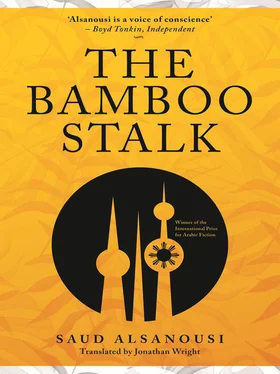‘I’m well,’ I said. Babu turned to us, hiding a smile, rather different from the person who had been frowning when he invited me to eat. He pointed at me, then spoke to the maid in Arabic. She burst out laughing. ‘What did he say?’ I asked her.
‘He said the old lady used to make fun of us when she saw us watching Indian movies. “How can you believe these stories?” she would say. And now her grandson turns up, just like in an Indian movie!’ said the maid.
I was taken aback when she said ‘her grandson’, which contradicted what Khawla had told me about the servants not knowing who I was.
‘And how do you know about me?’ I asked.
She pulled out a chair and sat opposite me at the table. ‘Don’t you be like them too!’ she said. ‘They treat us as if we have no feelings and don’t understand anything.’
‘You mean it was just a feeling you had that led you to the truth?’ I said.
She shook her head. Before she could continue the old Indian maid came in smiling. She was holding a broom and a plastic basket. The Filipina maid pointed to the cook and said, ‘Many years ago the old lady accused Babu of getting Josephine pregnant.’
I was stunned. All the things my mother had told me came back. She pointed at the Indian maid and introduced us. ‘Lakshmi, Babu’s wife, is the maid who replaced your mother after she and your father were thrown out,’ she said. ‘She was the first person to see you in your father’s arms when he came to visit the old lady after the months he lived outside the house.’
Everyone was smiling.
‘Does the family know that you know all this?’ I asked.
‘No, we have no feelings and we understand nothing,’ said the Filipina.
Babu took the plates off the table. ‘Miri, Luza,’ someone called from outside. It was Grandmother calling. Lakshmi went off and the Filipina maid prepared to follow her.
‘Thank you, Luza,’ I said. ‘And by the way, that’s an odd name,’ I added.
She stopped at the kitchen door and turned. ‘My name’s Luzviminda. The old lady didn’t like it, so she took off some of the letters and kept the rest.’
‘Luza, Luza,’ Grandmother called again, then followed it up with a word similar to the word the parrot cried whenever it called the same name.
‘Coming, Madam,’ Luzviminda replied, hurrying off. I pushed my chair back to get up. Luzviminda stuck her head round the kitchen door, saying, ‘The old lady didn’t like the name Lakshmi either. You can call her Miri like your grandmother does.’
She laughed and hurried off. I thanked old Babu for the delicious breakfast and left the kitchen. I stretched out on the bed in my room, repeating to myself: ‘Luzviminda, Luzviminda, Luz Vi Minda.’ That was a purely Filipino name. Why didn’t the maid have a Spanish or English name like many Filipinas? Teresa or Mercedes or Marilyn or Angeline?
The name was a composite of the first part of the name of each of the three main island groups in the Philippines — Luzon in the north, Visayas in the centre and Mindanao in the south. At first I decided to call her Luza, the name my grandmother had chosen for her, so that I wouldn’t think of the map of the Philippines every time I called her, since I very much needed to discover a new geography. But then I remembered how confused I myself could be about names and I had pangs of conscience. So I went back on my decision and stuck to Luzviminda, unchanged.
12
That’s how I spent the first months in my grandmother’s house, having three meals a day in the kitchen. The servants avoided me and wouldn’t speak to me in the courtyard but they changed completely once we were together in the kitchen, out of sight of the others. They chatted away and treated me well, except for Raju the driver, who avoided me. He was the only one who didn’t know anything about me, and he wasn’t on good terms with the other servants, who often warned me about him. I began to pick up some simple words of Arabic. I understood some and I would sometimes use Arabic in the same way as the servants in their dealings with the family or among themselves, when they spoke a mixture of English and broken Arabic.
In my room I spent the time watching television or films on DVD or browsing the Internet. I opened an email account for Merla and sent her the address and password by SMS, so then it was easy to communicate with her. I really missed her. Merla, my forbidden love. I spent lots of time writing to her or answering her messages.
At sunset I would go out for a walk in the neighbourhood. I would go to the central market and hang out in the shops nearby, then spend about an hour in the pedestrian street that ran parallel to the main street. The pedestrian street was long, with nothing to distinguish it. There were large houses on both sides, and on the other side lay the main road. On one part of the road, a stretch of no more than 200 metres, there were beautiful trees on both sides of the road. That was my favourite spot. I used to sit under a big blue sign that read Damascus Street , with my back to one of those water coolers that were common on the pedestrian street. People install them for charitable purposes, to quench the thirst of pedestrians or workmen on hot days. I would sit on the ground facing the main street, with a sandy area behind me without any houses. The cars on the main street would drive fast and make an irritating noise but I had to put up with the din in order to be close to the trees. It was the best place of all, compared with the others. I looked at the sandy area behind me and spoke to myself. ‘If it was mine,’ I said, ‘I would plant it with mango and jackfruit trees, pineapple and banana and all the other trees that grew on Mendoza’s land.’
Khawla visited me every day but she didn’t come into my room. She just stood at the door, sometimes chatting for hours like that, without either of us approaching the other. While Khawla and I were chatting, from time to time I could hear the upper-floor window sliding up and down in its frame. It was Grandmother looking out from her room, monitoring us and making sure that Khawla didn’t come into my room. Khawla didn’t go out much. She went to school in the morning. Sometimes she went out shopping or to cafés with Hind. She rarely saw her mother because Grandmother was uneasy about her granddaughter being in her stepfather’s house and Iman’s husband wouldn’t let Iman visit the home of her former husband. All Khawla had was the phone or quick meetings with her mother outside.
Hind decided to give me her share of the pension my father’s relatives were awarded because of his work in the resistance. It had been shared among her, Grandmother and Khawla. Although some of the pension should have been mine, I hadn’t asked for it. Hind would also send the servants every now and then with presents and clothes and phone top-up cards so that I could stay in touch with my family in the Philippines. I sent her an SMS by mobile whenever the servants brought me presents from her: Thanks, Auntie Hind . She would answer with just one word: Welcome . One day she took me to a government department that deals with official papers. She submitted some papers to them and was given some other papers. On a later visit to the same place we got a nationality certificate. It was a little booklet with four pages and a black cover with Arabic words in gold. In the middle there was an emblem like the one on the banknotes. On the second page there was a picture of me and underneath it said in Arabic: You are officially Kuwaiti . That’s what Hind told me, without turning to look at me, as she drove home. I said to myself, Yes, but what am I as far as the family’s concerned? I only met Hind very rarely, mostly by chance in the courtyard, but I saw her now and then on television, talking about things I didn’t understand.
Читать дальше












